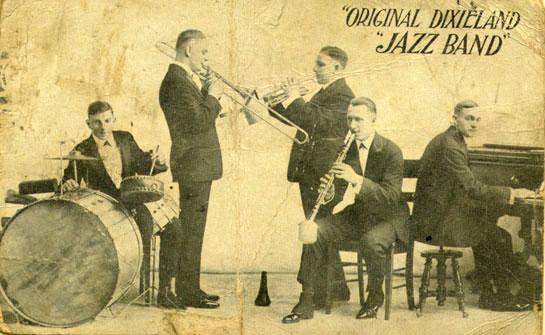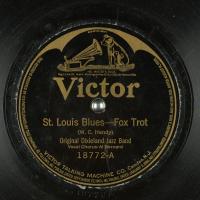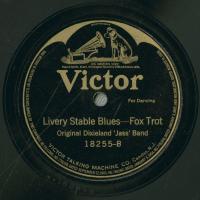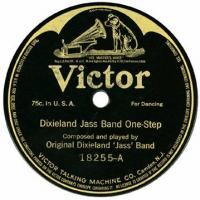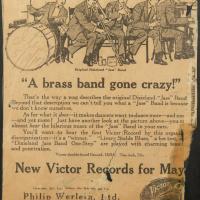Original Dixieland Jazz Band
When Victor released "Livery Stable Blues" backed by "Dixie Jass Band One-Step" in 1917, the ODJB became the first New Orleans jazz band on record. The band, led by cornetist Nick La Rocca, was made up of white musicians who had taken an interest in the new music being performed around the city by African-American pioneers such as Joe Oliver, Kid Ory and Louis Armstrong. Leaving New Orleans first for Chicago and later for New York, the band achieved a level of prominence and commercial success that was not yet available to black musicians. As Armstrong remembered it, the ODJB "were the first to record the music I played."
Although the ODJB are not usually credited with any musical innovations, their records did disseminate many of the features of the new New Orleans music: collective improvisation, driving 4/4 rhythm, the sound effects known as "freak music." They also reflected some of the origins of blues convention in minstrel shows. For example, the exaggerated "trombone slurs" used throughout "Jazz Me Blues (1921) were so common in minstrel shows that Bert Williams had parodied them to comic effect nearly a decade earlier.
The enormous popularity of their records -- the first one sold more than one million copies -- meant that they had a significant effect on the development of early jazz. For example, African-American bandleaders such as Joe Oliver reduced the size of their bands from seven to five in order to mimic the ODJB quintet. Since this meant that the band could no longer include a violin, the ODJB records may well be responsible for the limited role of the violin in early jazz. The band's success reflects the interplay of parody and ideas of authenticity
Although the ODJB are not usually credited with any musical innovations, their records did disseminate many of the features of the new New Orleans music: collective improvisation, driving 4/4 rhythm, the sound effects known as "freak music." They also reflected some of the origins of blues convention in minstrel shows. For example, the exaggerated "trombone slurs" used throughout "Jazz Me Blues (1921) were so common in minstrel shows that Bert Williams had parodied them to comic effect nearly a decade earlier.
The enormous popularity of their records -- the first one sold more than one million copies -- meant that they had a significant effect on the development of early jazz. For example, African-American bandleaders such as Joe Oliver reduced the size of their bands from seven to five in order to mimic the ODJB quintet. Since this meant that the band could no longer include a violin, the ODJB records may well be responsible for the limited role of the violin in early jazz. The band's success reflects the interplay of parody and ideas of authenticity
